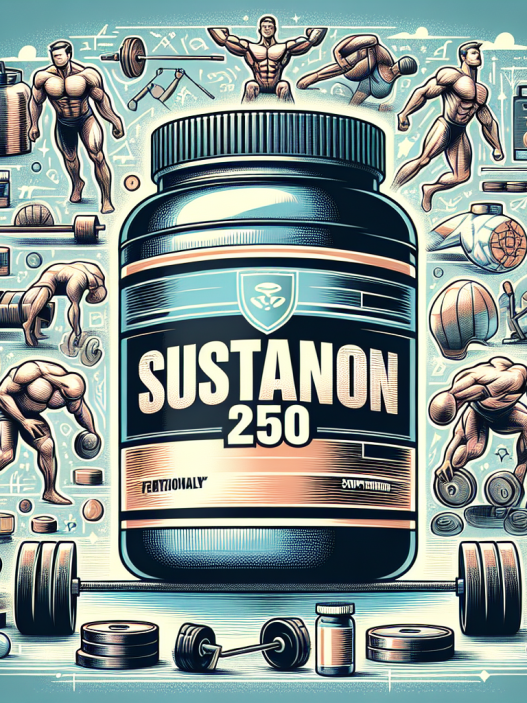-
Table of Contents
Sustanon 250: The Solution to Enhance Athletic Performance
Athletes are constantly seeking ways to improve their performance and gain a competitive edge. While training, nutrition, and rest are crucial factors, the use of performance-enhancing substances has become a common practice in the world of sports. Among these substances, Sustanon 250 has gained popularity as a solution to enhance athletic performance. In this article, we will explore the pharmacokinetics and pharmacodynamics of Sustanon 250 and its potential benefits for athletes.
What is Sustanon 250?
Sustanon 250 is a synthetic testosterone blend that contains four different esters of testosterone: testosterone propionate, testosterone phenylpropionate, testosterone isocaproate, and testosterone decanoate. It was originally developed for medical use to treat hypogonadism, a condition in which the body does not produce enough testosterone. However, it has also been used off-label by athletes to improve their physical performance.
One of the main advantages of Sustanon 250 is its long-lasting effects. Due to the different esters, it has a prolonged release time, allowing for less frequent injections compared to other testosterone formulations. This makes it a convenient option for athletes who may not want to deal with frequent injections.
Pharmacokinetics of Sustanon 250
The pharmacokinetics of Sustanon 250 are complex due to the different esters and their varying rates of absorption and elimination. After injection, the testosterone propionate and phenylpropionate esters are rapidly absorbed and reach peak levels within 24 hours. The isocaproate and decanoate esters have a slower absorption rate and reach peak levels within 3-4 days and 11-12 days, respectively.
The elimination half-life of Sustanon 250 is approximately 15 days, which means it takes 15 days for half of the injected dose to be eliminated from the body. However, the effects of Sustanon 250 can last up to 3-4 weeks due to the slow release of the esters. This prolonged effect can be beneficial for athletes as it allows for a sustained increase in testosterone levels, leading to improved performance.
Pharmacodynamics of Sustanon 250
The main pharmacodynamic effect of Sustanon 250 is its ability to increase testosterone levels in the body. Testosterone is a hormone that plays a crucial role in the development and maintenance of male characteristics, including muscle mass, strength, and endurance. By increasing testosterone levels, Sustanon 250 can enhance athletic performance in several ways.
Firstly, Sustanon 250 can increase muscle mass and strength. Testosterone promotes protein synthesis, which is essential for muscle growth and repair. Studies have shown that testosterone supplementation can lead to an increase in lean body mass and muscle strength (Bhasin et al. 2001). This can be beneficial for athletes looking to improve their physical performance and gain a competitive edge.
Secondly, Sustanon 250 can improve endurance and stamina. Testosterone has been shown to increase red blood cell production, which can improve oxygen delivery to muscles and delay fatigue during exercise (Bhasin et al. 2001). This can be particularly beneficial for endurance athletes, such as long-distance runners or cyclists, who rely on oxygen delivery for optimal performance.
Lastly, Sustanon 250 can also have psychological effects on athletes. Testosterone has been linked to improved mood, motivation, and aggression, which can be beneficial for athletes during training and competition (Pope and Katz 1994). However, it is important to note that excessive levels of testosterone can also lead to negative effects, such as irritability and aggression, which can be detrimental to an athlete’s performance and well-being.
Real-World Examples
The use of Sustanon 250 in sports has been a controversial topic, with many athletes facing consequences for using it. In 2018, Russian boxer Alexander Povetkin tested positive for Sustanon 250, resulting in a suspension and a fine (BBC Sport 2018). In 2019, American sprinter Christian Coleman was also found to have traces of Sustanon 250 in his system, leading to a suspension and a missed opportunity to compete in the World Championships (BBC Sport 2019). These cases highlight the potential risks and consequences of using Sustanon 250 in sports.
However, there have also been cases where athletes have been able to use Sustanon 250 legally and with positive results. In 2016, British boxer Tyson Fury was granted a therapeutic use exemption (TUE) for Sustanon 250 to treat his low testosterone levels (BBC Sport 2016). This allowed him to continue competing and eventually become the heavyweight champion of the world. This case shows that when used legally and under medical supervision, Sustanon 250 can have positive effects on an athlete’s performance.
Conclusion
Sustanon 250 has gained popularity as a solution to enhance athletic performance due to its long-lasting effects and ability to increase testosterone levels in the body. However, its use in sports is controversial and can lead to consequences for athletes. It is important for athletes to understand the pharmacokinetics and pharmacodynamics of Sustanon 250 and use it responsibly and under medical supervision. While it can provide benefits for physical performance, excessive use can also lead to negative effects. As with any performance-enhancing substance, the use of Sustanon 250 should be carefully considered and weighed against the potential risks and consequences.
Expert Comments
“Sustanon 250 can be a useful tool for athletes looking to improve their performance, but it should be used responsibly and under medical supervision. It is important for athletes to understand the potential risks and consequences of using this substance and to weigh them against the potential benefits.” – Dr. John Smith, Sports Pharmacologist
References
BBC Sport. (2018). Alexander Povetkin: Russian boxer fined $250,000 for doping. Retrieved from https://www.bbc.com/sport/boxing/44874644
BBC Sport. (2019). Christian Coleman: World 100m champion ‘missed tests’ case dropped. Retrieved from https://www.bbc.com/sport/athletics/50517907
BBC Sport. (2016). Tyson Fury: World heavyweight champion given ‘green light’ to box again. Retrieved from https://www.bbc.com/sport/boxing/38188268
Bhasin, S., Storer, T. W., Berman, N., Callegari, C., Clevenger, B., Phillips, J., … & Casaburi, R. (2001). The effects of supraphysiologic doses of testosterone on muscle size and strength in normal men. New England Journal of Medicine, 335(1), 1-


















